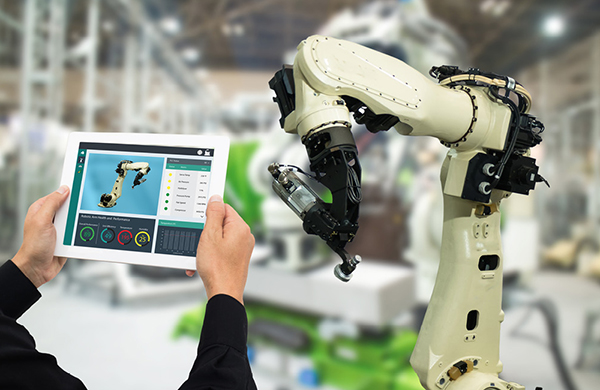Manufacturers Laser-Focused on Technology

Digital transformation is truly underway in manufacturing. While digital technologies such as cloud, mobile, big data and analytics, and Internet of Things have been industry drivers for years, manufacturers now have high expectations for the business value of technologies—edge computing, artificial intelligence (AI), collaborative robots (cobots), autonomous vehicles, 3D printing, augmented reality/virtual reality (AR/VR)—that are in earlier stages of adoption.
Forward thinkers are looking to innovate, change entire business models, and move into market adjacencies. That approach enables true competitive differentiation and sets up digitally transformed manufacturers for success in the near and long term.
The results of this shift can be seen across the value chain, in digital transformation (DX) initiatives such as the thinking supply chain, connected products and services, and Industry 4.0/smart manufacturing.
As all parts of the business continue to embrace DX, technology leaders and their counterparts in line-of-business (LOB) operations can consider the following 10 predictions to guide their strategic planning efforts:
1. Pushed by the success of early adopters, more than 40 percent of manufacturers will have enterprise-wide digital transformation initiatives in place by 2021.
2. By 2022, 35 percent of manufacturing organizations will have created new ecosystems by implementing AI- and blockchain-centric platforms, thus automating 50 percent of processes.
3. By 2022, driven by rising customer expectations and competition from the platform economy, 25 percent of manufacturers will be engaged in cross-industry collaboration, resulting in a 10-percent revenue increase.
4. By 2020, to increase speed, agility, efficiency, and innovation, 80 percent of manufacturers will need to extensively restructure, placing data at the center of their processes.
5. By 2021, 60 percent of manufacturers will have empowered shop floor workers with AR/VR, intelligent apps, and cobots, thus achieving productivity gains of up to 7 percent and more attractive work environments.
6. By 2024, more than 60 percent of G2000 manufacturing organizations will rely on AI platforms to drive digital transformation across the supply chain, leading to productivity gains of more than 20 percent.
7. By 2022, digital technologies will have enabled the automation of repetitive operational tasks, leading to 50 percent less planner intervention and "touchless" sales and operations planning.
8. By 2024, 50 percent of manufacturers will network related product and asset digital twins into digital twin ecosystems, for a systems-level view of their business and 5 percent reduction in quality costs.
9. By 2021, 90 percent of manufacturers will leverage real-time equipment and asset performance data to self-diagnose issues in advance and trigger a service intervention.
10. By 2023, 50 percent of the spend on DX initiatives in manufacturing will come from dedicated digital transformation budgets, instead of traditional IT or LOB budgets.
—Reid Paquin, Research Director
IT Priorities and Strategies
IDC Manufacturing Insights
